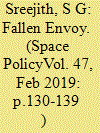|
|
|
Sort Order |
|
|
|
Items / Page
|
|
|
|
|
|
|
| Srl | Item |
| 1 |
ID:
095039


|
|
|
|
|
| Publication |
2010.
|
| Summary/Abstract |
The UK defence economy has some distinctive features. Its Armed Forces have a worldwide capability reflected in modern air, land and sea forces with an expeditionary role. Its world role is further reflected in a nuclear capability and a high technology defence industrial base, substantial defence R&D with the UK as a major arms exporter. This survey focuses on the period 1970 to 2008. It explains the military-industrial complex and estimates a demand for military expenditure function. There follows an analysis of procurement and defence industrial policy. Future policy issues are outlined, namely, the costs of the UK's world role and its relations with European defence policy. It is concluded that the UK faces some difficult defence choices.
|
|
|
|
|
|
|
|
|
|
|
|
|
|
|
|
| 2 |
ID:
169305


|
|
|
|
|
| Summary/Abstract |
This article revisits the legal status of astronauts by recounting the tale of their rise and fall in the International Space Law (ISL). ISL in its early years declared astronauts as envoys of mankind, although it later on entered into a state of forgetfulness of the term, replacing it with the more contemporaneous term “personnel.” Personnel brought a sense of everydayness and pragmatism to ISL as against the idealism attached to astronauts and to their status as the envoys of mankind's romantic collective. Spotlighting on this shift, this article argues that the term astronaut has, in fact, a semiotic effect in ISL that constantly evokes proud memories of human conquest of outer spaces. That is to say, in bestowing astronauts with the status of envoys of mankind, ISL mainly meant to record the remarkable feat of that day rather than actualizing astronauts in the deontological landscape of law. Later on, mindful of the burgeoning space activities and the need to regulate them, ISL espoused the term personnel to refer to space travelers. Today ISL governs the activities of personnel, whereas astronaut has a logocentric presence therein. Drawing on a relevant understanding of contemporary society and culture, the article concludes that astronauts have a legacy in law and society—they continue to exist as a cultural symbol in society and as a symbol of a culture in ISL.
|
|
|
|
|
|
|
|
|
|
|
|
|
|
|
|
| 3 |
ID:
148216


|
|
|
|
|
| Summary/Abstract |
The Chinese People’s Liberation Army (PLA) is halfway through a multi-decade modernization process. It has begun a major restructuring effort as it shifts its focus from a traditional continental defensive posture to a more maritime-oriented emphasis. In order to create more balanced joint force, it has adjusted the structure of its highest command organization, the Central Military Commission; abolished the former four General Departments and seven Military Regions; created five new joint Theater Commands and service-level commands for the Army and Rocket Force; and is reducing the size of its active duty force by 300,000 personnel. While seeking to overcome numerous internal obstacles, the PLA continues to develop and improve its capabilities to conduct integrated joint operations to deter a variety of threats to China’s sovereignty and territory and, if deterrence fails, to win informationized local war.
|
|
|
|
|
|
|
|
|
|
|
|
|
|
|
|
| 4 |
ID:
186098


|
|
|
|
|
| Summary/Abstract |
We test two sets of alternative hypotheses about the demographic composition of the U.S. armed forces. We analyse individual-level data of two national representative samples covering the period 1979–2008. We find that, in contrast to the accepted wisdom, the U.S. military no longer primarily recruits individuals from the most disadvantaged socio-economic backgrounds. Technological, tactical, operational and doctrinal changes have led to a change in the demand for personnel. As a result, on different metrics such as family income and family wealth as well as cognitive abilities, military personnel are on average like the average American citizen or slightly better.
|
|
|
|
|
|
|
|
|
|
|
|
|
|
|
|
| 5 |
ID:
158633


|
|
|
|
|
| Summary/Abstract |
Existing literature on China’s Performance Evaluation System and how it shapes cadre behavior tends to assume a hierarchy of work targets either through the framework of soft targets, hard targets, and priority targets with veto power or through target measurability. However, this traditional conceptualization of target hierarchy can no longer capture the nature of content of today’s Performance Evaluation System nor can it explain cadre behavior under the new economic and political order imposed by Xi Jinping. Based on field research conducted in various administrative level localities of four provinces during 2014, 2016, and 2017, I argue that today’s Performance Evaluation System has evolved into an increasingly balanced system driven by three prevailing features: the diminishing hard/soft targets dichotomy, the much more constrained power of priority targets with veto power, and the comprehensive quantification of evaluation targets. This study contributes to an updated understanding of the incentive mechanism of the Performance Evaluation System and how that can help explain cadre behavior today. The findings of the research have important political and economic implications on the Xi administration and the Communist Party.
|
|
|
|
|
|
|
|
|
|
|
|
|
|
|
|
| 6 |
ID:
185476


|
|
|
|
|
| Summary/Abstract |
This article provides the context for the articles in this Special Issue on Sweden and its defence. The article starts with Sweden before presenting Swedish defence, its economy, the military threats, the defence industry, the personnel and the guiding principles of defence. Swedish principles for governance of the public agencies in general and within the defence sector in particular are described. A presentation of the Swedish Defence Research Institute (FOI) and its defence economic activities is also provided.
|
|
|
|
|
|
|
|
|
|
|
|
|
|
|
|
|
|
|
|
|